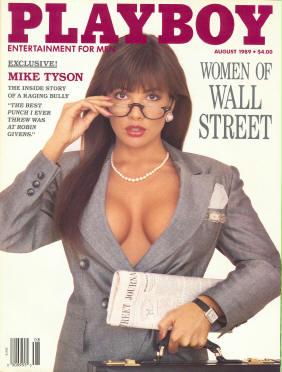What Playboy Playmates can teach you about making accurate predictions
.
In 2006 ten Playboy Playmates were asked to make stock picks.
Half the Playmates beat the S&P 500 while less than a third of professional money managers were able to.
Via The Success Equation: Untangling Skill and Luck in Business, Sports, and Investing:
In 2006, Tradingmarkets, a company that helps people trade stocks, asked ten Playboy Playmates to select five stocks each. The idea was to see if they could beat the market. The winner was Deanna Brooks, Playmate of the Month in May 1998. The stocks she picked rose 43.4 percent, trouncing the S& P 500, which gained 13.6 percent, and beating more than 90 percent of the money managers who actively try to outperform a given index. Brooks wasn’t the only one who fared well. Four of the other ten Playmates had better returns than the S& P 500 while less than a third of the active money managers did.
How?
The answer is easy — unlike more skill-based activities, a great deal of picking stocks is about luck.
And therein lies a mistake we’re all prone to.
As Michael Mauboussin explains in his fascinating new book, The Success Equation: Untangling Skill and Luck in Business, Sports, and Investing we are often terrible about distinguishing when challenges are about skill and when they’re about luck, leading us to make less accurate predictions.
So how can you make more accurate predictions?
First, look at the event you’re trying to predict and take the time to think about how much skill is involved vs luck. This will determine what evidence you should focus on.
Via The Success Equation: Untangling Skill and Luck in Business, Sports, and Investing:
When we make predictions, we often fail to recognize the existence of luck, and as a consequence we dwell too much on the specific evidence, especially recent evidence. This also makes it tougher to judge performance. Once something has happened, our natural inclination is to come up with a cause to explain the effect. The problem is that we commonly twist, distort, or ignore the role that luck plays in our successes and failures. Thinking explicitly about how luck influences our lives can help offset that cognitive bias.
Whether skill or luck is more central will determine whether you should lean on general statistics, or whether you should strongly consider the specifics of this particular event.
Via The Success Equation: Untangling Skill and Luck in Business, Sports, and Investing:
When skill plays the prime role in determining what happens, you can rely on specific evidence… In activities where luck is more important, the base rate should guide your prediction.
The takeaway:
- When luck is the bigger factor (like playing the lottery) go with the statistics: You have a 1 in 10 gazillion chance of winning. Ignore the specifics; just because it’s you playing and you’re playing your favorite number doesn’t mean much.
- When skill is the bigger factor (a fist fight) ignore the general statistics and look at the specifics of the individual case (it’s Batman in the fist fight and Batman always wins.)
Join 45K+ readers. Get a free weekly update via email here.
Related posts:
What does nearly every genius have in common when it comes to work habits?
Checklist: Are you doing these five things to be the best?
Is it true that 10000 hours of practice will make you an expert at something?




